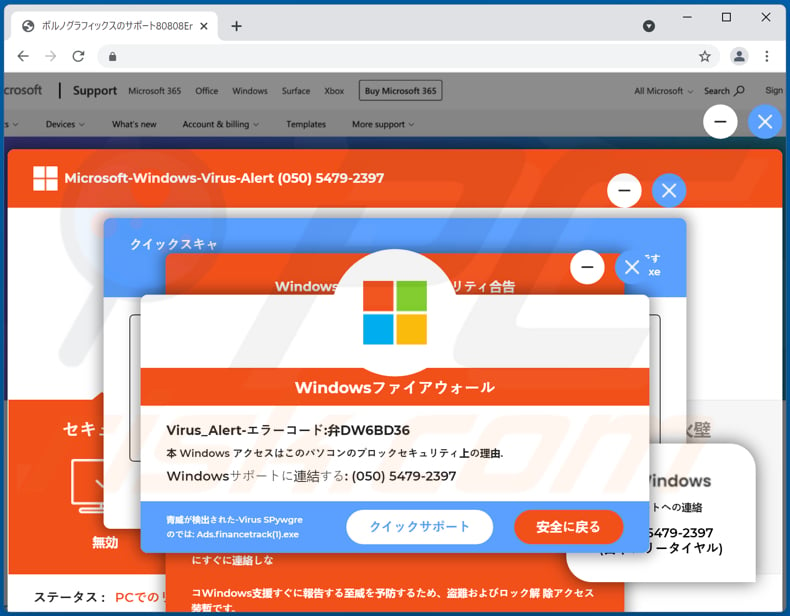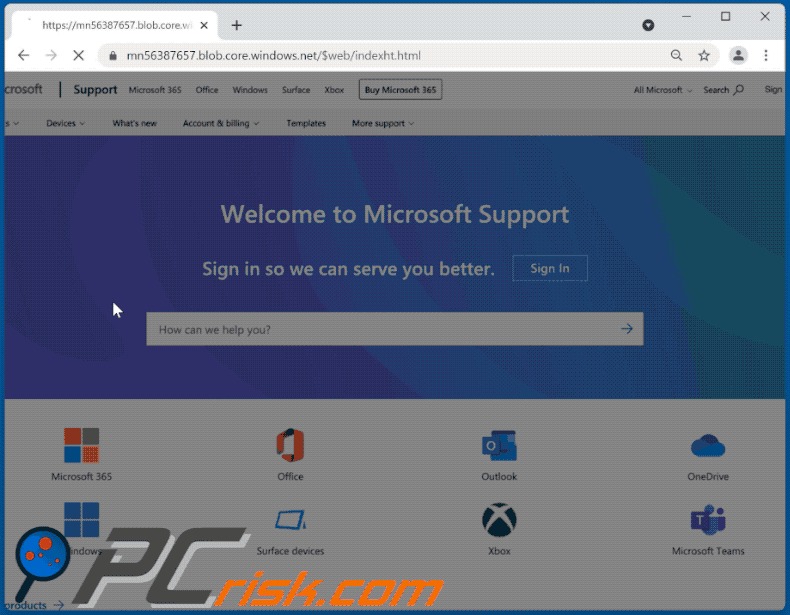How to recognize tech support scams like Microsoft Windows Virus Alert?
Phishing/ScamAlso Known As: Microsoft Windows Virus Alert technical support scam
Get free scan and check if your device is infected.
Remove it nowTo use full-featured product, you have to purchase a license for Combo Cleaner. Seven days free trial available. Combo Cleaner is owned and operated by RCS LT, the parent company of PCRisk.com.
What is Microsoft Windows Virus Alert scam?
It is a technical support scam that uses scare tactics (displays a fake virus alert) to trick visitors into calling scammers and then paying money for fake services and products and (or) installing potentially malicious software. Users never visit scam pages like this one intentionally.

Microsoft Windows Virus Alert scam in detail
This scam is designed to trick visitors into believing that their computers are infected with a Trojan designed to steal email and Facebook login credentials, banking information. It claims that visitors have to call the (050) 5479-2397 number to protect (and unblock) their computers.
Usually, scammers behind such scams try to extract money and (or) personal information or to trick users into installing malware, a remote administration tool that would allow them to access a computer or other software. Either way, these scams must be ignored.
| Name | Microsoft Windows Virus Alert technical support scam |
| Threat Type | Phishing, Scam, Social Engineering, Fraud |
| Fake Claim | A computer has been infected with a Trojan and adware |
| Disguise | Virus notification from Microsoft |
| Tech Support Scammer Phone Number | (050) 5479-2397 |
| Additional Information | Text in scam is written in Japanese language |
| Related Domain | mn56387657.blob.core.windows[.]net |
| Detection Names (mn56387657.blob.core.windows[.]net) | Emsisoft (Phishing), Full List Of Detections (VirusTotal) |
| Symptoms | Fake error messages, fake system warnings, pop-up errors, hoax computer scan. |
| Distribution methods | Compromised websites, rogue online pop-up ads, potentially unwanted applications. |
| Damage | Loss of sensitive private information, monetary loss, identity theft, possible malware infections. |
| Malware Removal (Windows) |
To eliminate possible malware infections, scan your computer with legitimate antivirus software. Our security researchers recommend using Combo Cleaner. Download Combo CleanerTo use full-featured product, you have to purchase a license for Combo Cleaner. 7 days free trial available. Combo Cleaner is owned and operated by RCS LT, the parent company of PCRisk.com. |
Online scams in general
Scam pages like this one are disguised as official Microsoft or other software company pages and encourage visitors to call the provided number (or numbers) as soon as possible. No legitimate company has anything to do with such scams.
More examples of similar pop-up scams are "Windows_Firewall_Protection_Alert", "Access To This Pc Has Been Blocked For Security Reasons", and "Firewall Spyware Alert". Typically, these pages get opened through shady ads, other dubious pages or present potentially unwanted applications (PUAs).
How did potentially unwanted applications install on my computer?
Most users download and install PUAs through downloaders or installers for other programs, advertisements designed to run certain scripts (by clicking on them), fake installers. PUAs included in downloaders and installers can be deselected using their "Custom", "Advanced", "Manual" or other settings.
Users who do not deselect optional downloads or installations using the aforementioned agree to download or install PUAs. It is worth mentioning that fake installers used to distribute PUAs usually are promoted on deceptive pages.
How to avoid installation of potentially unwanted applications?
Download programs (and files) from trustworthy, official websites. Avoid using other sources - they can be used to distribute questionable and malicious software. Do not click on advertisements that appear on dubious pages. Deselect unwanted optional downloads or installations before downloading or installing programs.
If your computer is already infected with PUAs, we recommend running a scan with Combo Cleaner Antivirus for Windows to automatically eliminate them.
The appearance of Microsoft Windows Virus Alert pop-up scam (GIF):

Text in this scam (written in Japanese):
サポートへの連絡
(050) 5479-2397
(日本フリータイヤル)Microsoft-Windows-Virus-Alert (050) 5479-2397
あなたは保護されます
保護アップデート 流れ
最後のスキャン 利用できません| クイックスキャ
使用ライセンス 1/5| 別のデバイ
セキュリテ無効
同一性危険にさらされて
性能最適化された
防火壁オフにする
ステータス :PCでのリスクにクイックスキャ
走査共通感染地域のスタートアップファイルです
C:WindowsSystem32sihost.exe
結果の概要
[+] スキャンされた合計項目:218
[+] 総セキュリティリスク検出:0
[+] 総合セキキュリティリスク解決:0
注意が必要なセキュリティリスク:0
一時停止 止まれ
Windows-Defender-セキュリティ合告
** アクセスはこのパソコンのプロックセキュリティ上の理由 **
お使いのコンピュータは、それがトロイの木馬のスパイウェアに三数してい ること 以下のデータが侵害されました。
> メール人資格情報
> 銀行だスワード
> Facebookログイン
> 写真質料
Windows-Defender_Scanは、あなたのパスワードを盗むことができ、こ のデバイス上の潜在的に不要なアドウェアを発見しました,オンラテインid財 物情報個人ファイル
私達のエンジニアが電話による取り外しプロセスによって歩くことができる ように私達にすぐに連絡しな
コWindows支援すぐに報告する至威を予防するため、盗難およびロック解 除アクセス装暫です。
このウィンドウを閉じると、お客様の個人情報が危険にさらされ、 Windows登録が停止されます。
Windowsサポートに連絡する: (050) 5479-2397
キャンセル OK
Windowsファイアウォール
Virus_Alert-エラーコード:弁DW6BD36
本 Windows アクセスはこのパソコンのプロックセキュリティ上の理由.
Windowsサポートに連結する: (050) 5479-2397
青威が検出された-Virus SPywgre
のでは: Ads.financetrack(1).exe
Instant automatic malware removal:
Manual threat removal might be a lengthy and complicated process that requires advanced IT skills. Combo Cleaner is a professional automatic malware removal tool that is recommended to get rid of malware. Download it by clicking the button below:
DOWNLOAD Combo CleanerBy downloading any software listed on this website you agree to our Privacy Policy and Terms of Use. To use full-featured product, you have to purchase a license for Combo Cleaner. 7 days free trial available. Combo Cleaner is owned and operated by RCS LT, the parent company of PCRisk.com.
Quick menu:
- What is Microsoft Windows Virus Alert technical support scam?
- How to identify a pop-up scam?
- How do pop-up scams work?
- How to remove fake pop-ups?
- How to prevent fake pop-ups?
- What to do if you fell for a pop-up scam?
How to identify a pop-up scam?
Pop-up windows with various fake messages are a common type of lures cybercriminals use. They collect sensitive personal data, trick Internet users into calling fake tech support numbers, subscribe to useless online services, invest in shady cryptocurrency schemes, etc.
While in the majority of cases these pop-ups don't infect users' devices with malware, they can cause direct monetary loss or could result in identity theft.
Cybercriminals strive to create their rogue pop-up windows to look trustworthy, however, scams typically have the following characteristics:
- Spelling mistakes and non-professional images - Closely inspect the information displayed in a pop-up. Spelling mistakes and unprofessional images could be a sign of a scam.
- Sense of urgency - Countdown timer with a couple of minutes on it, asking you to enter your personal information or subscribe to some online service.
- Statements that you won something - If you haven't participated in a lottery, online competition, etc., and you see a pop-up window stating that you won.
- Computer or mobile device scan - A pop-up window that scans your device and informs of detected issues - is undoubtedly a scam; webpages cannot perform such actions.
- Exclusivity - Pop-up windows stating that only you are given secret access to a financial scheme that can quickly make you rich.
Example of a pop-up scam:

How do pop-up scams work?
Cybercriminals and deceptive marketers usually use various advertising networks, search engine poisoning techniques, and shady websites to generate traffic to their pop-ups. Users land on their online lures after clicking on fake download buttons, using a torrent website, or simply clicking on an Internet search engine result.
Based on users' location and device information, they are presented with a scam pop-up. Lures presented in such pop-ups range from get-rich-quick schemes to fake virus scans.
How to remove fake pop-ups?
In most cases, pop-up scams do not infect users' devices with malware. If you encountered a scam pop-up, simply closing it should be enough. In some cases scam, pop-ups may be hard to close; in such cases - close your Internet browser and restart it.
In extremely rare cases, you might need to reset your Internet browser. For this, use our instructions explaining how to reset Internet browser settings.
How to prevent fake pop-ups?
To prevent seeing pop-up scams, you should visit only reputable websites. Torrent, Crack, free online movie streaming, YouTube video download, and other websites of similar reputation commonly redirect Internet users to pop-up scams.
To minimize the risk of encountering pop-up scams, you should keep your Internet browsers up-to-date and use reputable anti-malware application. For this purpose, we recommend Combo Cleaner Antivirus for Windows.
What to do if you fell for a pop-up scam?
This depends on the type of scam that you fell for. Most commonly, pop-up scams try to trick users into sending money, giving away personal information, or giving access to one's device.
- If you sent money to scammers: You should contact your financial institution and explain that you were scammed. If informed promptly, there's a chance to get your money back.
- If you gave away your personal information: You should change your passwords and enable two-factor authentication in all online services that you use. Visit Federal Trade Commission to report identity theft and get personalized recovery steps.
- If you let scammers connect to your device: You should scan your computer with reputable anti-malware (we recommend Combo Cleaner Antivirus for Windows) - cyber criminals could have planted trojans, keyloggers, and other malware, don't use your computer until removing possible threats.
- Help other Internet users: report Internet scams to Federal Trade Commission.
Frequently Asked Questions (FAQ)
What is a pop-up scam?
It is a type of scam used to trick unsuspecting users into downloading files, installing unwanted (potentially malicious) software, or providing personal information. Typically, it uses scare tactics to trick users into that.
Why do I encounter fake pop-ups?
Most pop-up scams are promoted through untrustworthy websites, potentially unwanted applications, deceptive advertisements. Users do not open these scam pages intentionally.
Will Combo Cleaner protect me from pop-up scams?
Combo Cleaner can scan websites and detect malicious ones, including pages designed to deliver pop-up scams. It warns users about such pages immediately and restricts access to them.
Share:

Tomas Meskauskas
Expert security researcher, professional malware analyst
I am passionate about computer security and technology. I have an experience of over 10 years working in various companies related to computer technical issue solving and Internet security. I have been working as an author and editor for pcrisk.com since 2010. Follow me on Twitter and LinkedIn to stay informed about the latest online security threats.
PCrisk security portal is brought by a company RCS LT.
Joined forces of security researchers help educate computer users about the latest online security threats. More information about the company RCS LT.
Our malware removal guides are free. However, if you want to support us you can send us a donation.
DonatePCrisk security portal is brought by a company RCS LT.
Joined forces of security researchers help educate computer users about the latest online security threats. More information about the company RCS LT.
Our malware removal guides are free. However, if you want to support us you can send us a donation.
Donate
▼ Show Discussion